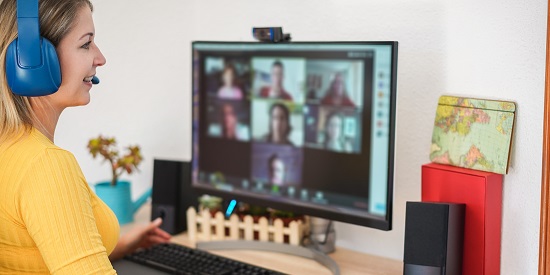What works best to support virtual teamwork? Study shows two sides
Media release
For virtual teamwork to be effective, workplaces need to foster interdependence in some areas and avoid it in others, according to a newly published study of virtual teams.
The study - a collaboration between researchers from Deakin University and the University of Western Australia - shows that virtual teams perform at their best when everyone has equal access to resources and information. Yet, workflows should also be structured in a way that team members can rely on one another and work closely together to reach a common goal.
Researcher Dr Florian Klonek, from Deakin Business School's Department of Management, said the exponential increase in virtual teams post-pandemic meant there was a lot of focus on how to make these types of teams work more effectively.
"Virtual teams, which include people who work from varied locations, are a bit different in how they work because a lot of their processes and communication require the use of digital tools," Dr Klonek said.
"Previous research shows some virtual teams underperform, so we wanted to better understand what helps and hinders virtual teams to work more effectively."
The researchers conducted an experiment with 102 virtual teams, manipulating two different types of task 'interdependence', which mediate the workflow between team members.
- 'Resource interdependence' - a work structure that indicates how much team members have to rely on one another to access critical information or resources. For example, some team members may hold access to specific pieces of information or resources versus all team members have access to all resources.
- 'Process interdependence' - a work structure that reflects how collaborative the workflow between team members is. For example, team members working separately on a task, like a production chain, and then just piecing it together versus all team members working intensively together.
The researchers discovered that virtual teams were most effective when they had low resource interdependence (everyone had equal access to all resources), and high levels of process interdependence (when they were encouraged to work more collaboratively and not in piecemeal fashion).
"These results are important for managers and organisations in thinking about how they can design work for virtual teams to help them improve their performance," Dr Klonek said.
"For example, if you work in a virtual team, it's important to have a shared folder where everyone has the same access to information and resources so they can be effective.
"Managers also need to rethink how workflows are structured and who engages with whom. Virtual teams tend to be less connected, but our research shows that managers need to try to increase connection for workers to feel engaged and work through a task effectively.
"This approach is useful when thinking about hybrid teams too, which are also increasingly common post-pandemic. It's important to think about what tasks we need to do when we're all in the office together and what is better to do when we're alone and be very deliberate in how we break up work in this way."
Researcher Dr Lisette Kanse, from the University of Western Australia, said virtual workplace collaboration tools like Teams, Google Drive, Trello and Slack offered a way to meet both teamwork targets highlighted in the research, allowing a central repository for shared information as well as an easier way to connect and collaborate with teammates.
"These online tools allow teams to work more organically with virtual teammates. They allow real-time, live collaborations where people can work concurrently on the same item without creating version conflicts," Dr Kanse said.
"For example, when it comes to working through tasks and problems with colleagues, Teams conversations can work far better than email chains, which are sent and received one by one and make work look like a production line.
"As much as possible, you want to emulate a face-to-face teamwork experience, because that's where most people experience the benefits of teamwork."
You can read the full paper 'Interdependence in Virtual Teams—A Double-Edged Sword?' in the journal Small Group Research. Plus, you can find out more about Dr Klonek's related research evaluating the importance of feedback for virtual teams on the Deakin Business School Newsroom.

